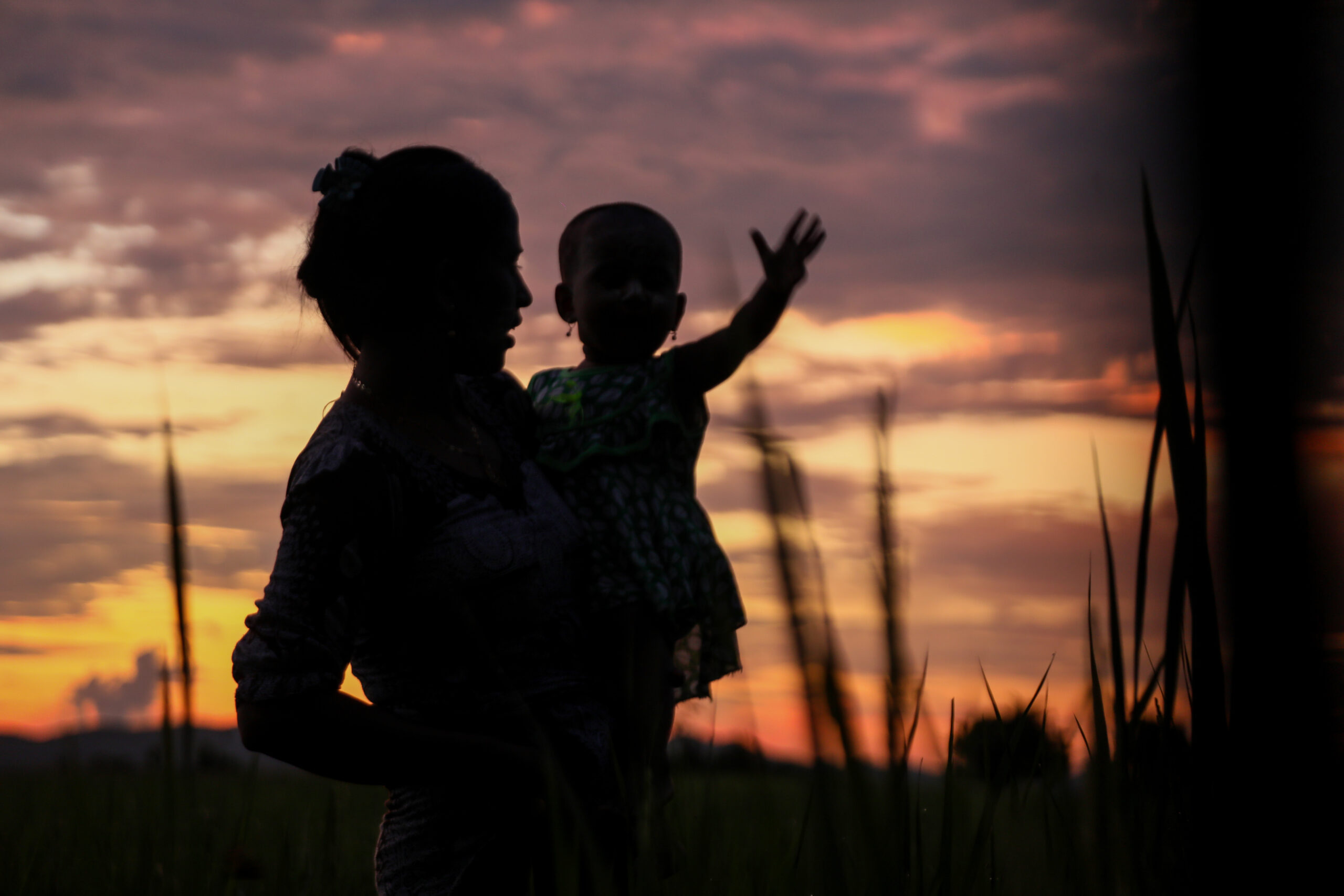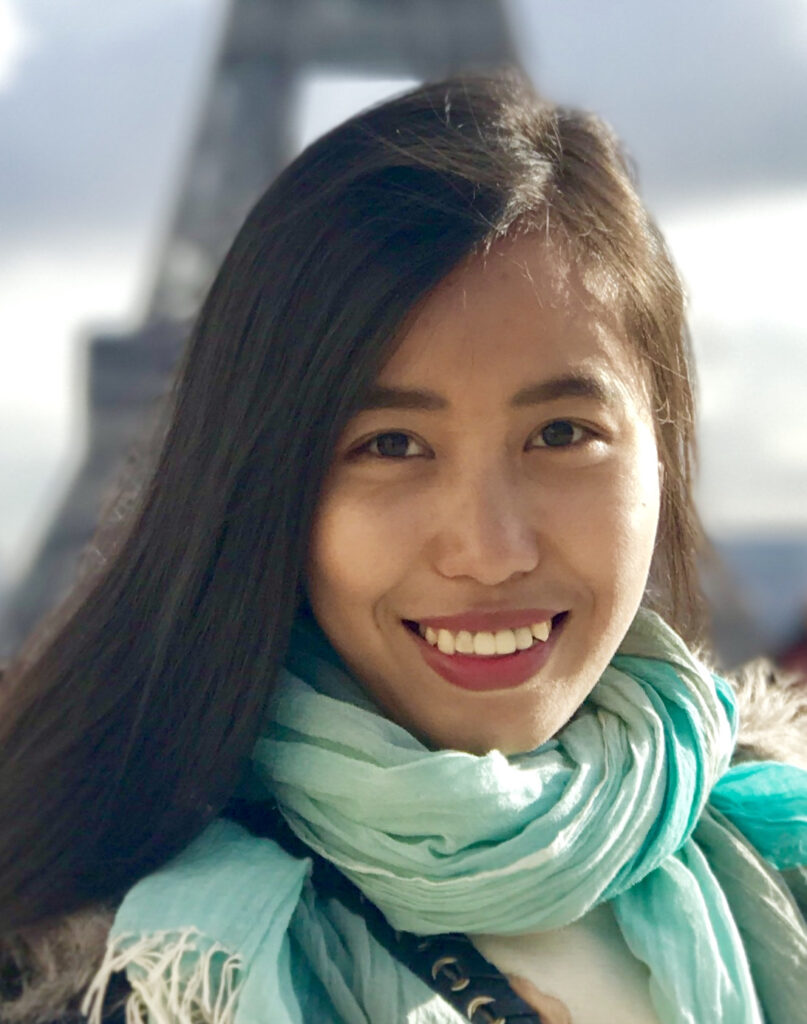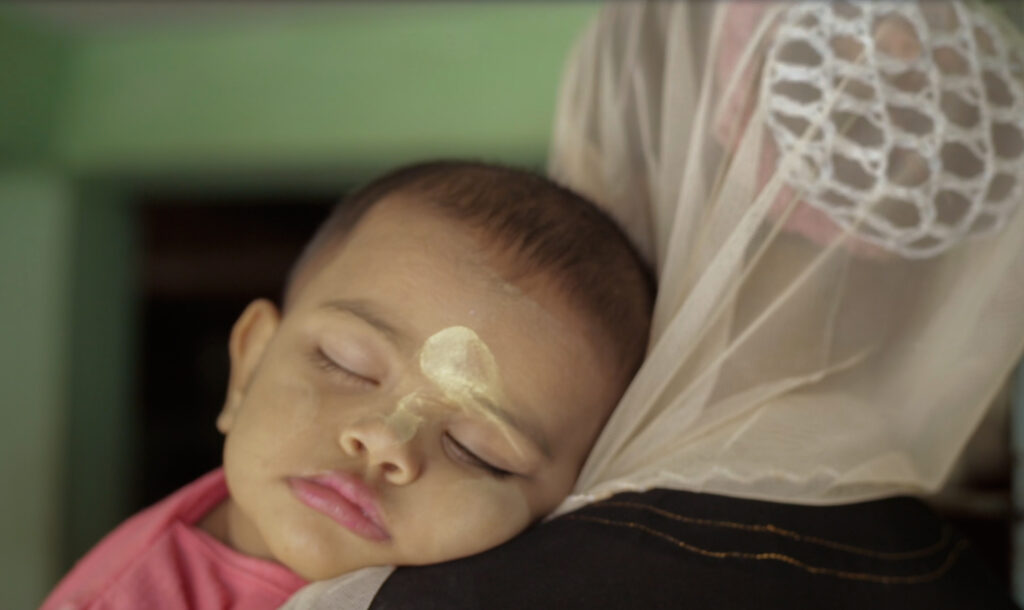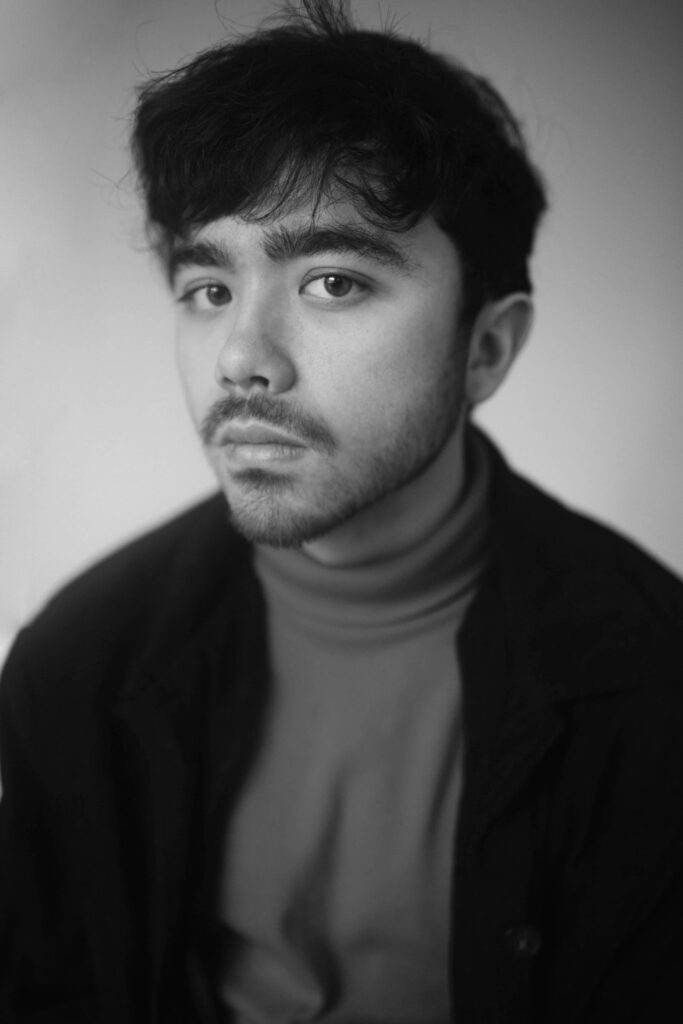
01 Mar Maneuvering Home: An Interview with the Director and Producer of Midwives
BY AARON HUNT
Every day before filming, director Snow Hnin Ei Hlaing and her cinematographer Thae Zar Chi Kang crossed a military checkpoint into a village in Rakhine State. Hlaing grew up here; her auntie even introduced her to the eponymous midwives, Hla and Nyo-Nyo. But filming documentaries is dangerous in Myanmar, let alone Rakhine State, a flashpoint of the Burmese Government and Tatmadaw’s (Myanmar’s official military) ongoing violence towards Rohingyans. To avoid unwanted attention from soldiers and police, Hlaing consistently kept a low profile and reevaluated her safety throughout production. Hla, the only Buddhist midwife who treats Rohingyan patients in the village, receives death threats for doing so. But Nyo-Nyo, the Rohingyan midwife who assists Hla, faces potential violence every day. The film spans the Tatmadaw’s ethnic cleansing of Rohingyans, the latter’s mass exodus to the world’s largest refugee settlement in Bangladesh, and continuous warfare. The 2021 coup occurred just after. This hotbed of martial oppression, which is in many ways an enduring consequence of the British and Japanese occupations of Myanmar, constantly encroaches on Hlaing’s intimate portrait of Hla and Nyo-Nyo’s daily lives.
Midwives premiered at Sundance 2022 and received the Special Jury Award for Excellence in Vérité Filmmaking. It will premiere in the forthcoming 35th season of POV.
Aaron Hunt interviewed filmmaker Snow Hnin Ei Hlaing and her producer and editor Mila Aung-Thwin for cinéSPEAK.
cinéSPEAK: Did you see a direct correlation between the escalating political tensions in Myanmar to Hla’s escalating antagonism and racism towards Nyo-Nyo and her patients?
Mila Aung-Thwin: I think this is something we recognized in the footage. There was a parallel story between her and Nyo-Nyo’s relationship and what’s going on outside. But we don’t really say whether it’s what’s causing the rift or not.
Snow Hnin Ei Hlaing: It became tenser when Nyo-Nyo was pregnant and couldn’t help in the clinic. It was hard for Hla when she was alone and had no one to translate. She experienced a lot of miscommunications between her and her Rohingya patients. Around that time, she became a lot more aggressive. Hla was also not happy when Nyo-Nyo decided to make her own clinic. At the same time, the political situation was escalating. So everything reflects on these two.
cinéSPEAK: Did you or your DP [the only person on set besides Snow] understand Rohingya language? If not, what was it like to translate what you couldn’t understand in the moment after the fact?
SHEH: I don’t understand Rohingya language. Only Nyo-Nyo was translating for me. I hired a Rohingyan translator, Pu Sue, after we stopped filming. I couldn’t understand the everyday conversations between Rohingyan women, so it was important to find and include more dialogue between them. When Nyo-Nyo makes her own clinic, she treats her patients in the village so differently from Hla. She was very caring and [after translating we found out she] told them that she’ll treat them whether or not they had money.
cinéSPEAK: Nyo-Nyo struggles to accrue the funds to start her own clinic. In the Sundance Q&A, a producer mentions you’re starting a private fund for clinics in Rakhine. Can you tell me more about that?
MAT: We haven’t set that up yet because we’re a little concerned about security. The fund we have now is so that Hla and Nyo-Nyo have emergency security funds in case the Government catches wind of the film and they need to leave. In this case, it’s so clear that what these women need is medical supplies, which is very actionable. We’ll probably start that closer to the theatrical release of the film, and when we release on POV, not with the festival run.
cinéSPEAK: Do many documentaries account for Emergency Security Funds in the initial budget?
MAT: No. Snow can maybe attest to how much she had to play the security fears by ear. In the beginning, making a film about Rohingya at all was dangerous. Now, this topic isn’t as sensitive in Myanmar. What’s volatile now is that the military has toppled the government–any negative talk about the government is a crime, and people are thrown into jail for being artists, or seeming like they’re activists. So we had to scramble to raise money when we found out the film was playing at Sundance–that it would be a fairly big film. We knew we should have things in place, so we did that in the last 6 months before the release.
cinéSPEAK: Is it becoming more common for documentaries to also function as a median for tangible/monetary support?
MAT: Mostly what we do is facilitate the audience. We can get the ball rolling and make sure that people are safe, but there’s usually an outpouring from the audience– “What can we do? How can we help these people?” They fall in love with the people over the course of the film who have an obvious need. In the earlier days of documentary, someone would watch a film and think, “Wow. I’ll never meet that person.” But now you can actually reach out and have a conversation with them. I think people are feeling the connectedness of that, and I think that’s a positive attribute of the internet and how crowdfunding works now.

cinéSPEAK: Have you faced pushback from the junta for the film already? Can you still film in or even visit Rakhine State, Snow?
SHEH: I left Myanmar in June when the military coup started. Afterward, they started arresting artists and activists. I’ve been very much concerned about my security. It is not easy for me, you know? I cannot go back home right now. If I did I would be arrested. But as Mila said, for the people in the film, we have emergency funding if they need to go somewhere. I don’t think this will happen to them, but we have it in case. We also have support for my cinematographer, Thae Zar Chi Kang, who lives in Myanmar.
But there have always been security concerns. There was a civil war between the Myanmar Military and Rakhine, in the village where I was shooting. Then the coup happened. As a local filmmaker, it’s more difficult to make a film in Myanmar. It’s actually easier for a foreign filmmaker to shoot one. A foreigner can bring a camera, and nobody will ask questions. But whenever local filmmakers go to shoot we get questioned by soldiers or police. It’s been like that ever since I started this career.
cinéSPEAK: Are there communities of Burmese documentarians that share resources and support?
SHEH: There are really only a handful of filmmakers continuously making feature-length documentaries–maybe not even a handful.
MAT: There is an active film school that focuses on documentary, where Snow and I both met–the Yangon Film School. Snow’s been attached to them for over ten years. I was also involved with the Human Dignity Film Institute, which taught documentary as well. However, their founder, Min Htin Ko Ko Gyi, was arrested on the first day of the military coup. One of our former students, from when Snow and I both taught there, is in jail for making a film. There is a community, but there’s absolutely no funding. People make things with their own money–and then it’s dangerous.
cinéSPEAK: Did Nyo-Nyo ever confront Hla about her racism off-camera?
SHEH: She never confronted her, because she is her apprentice. As you see in the film, she gets very upset. But how can she confront Hla when she’s being very racist and criticizes Rohingya people? Nyo-Nyo confided in me a lot. She had to be very patient because she is in a rare position to receive support from Hla somehow.
MAT: I think she reacts by deciding she has to start her own thing. She learned what she needs to learn and it’s time. Hla did the classic mentor thing– “I mistreated you, I taught you stuff–how dare you leave! You’re not ready yet!” From the footage I saw, Nyo-Nyo tried to stay positive about it, but at some point, she decided to do her own thing–which was probably her goal all along, you know?
cinéSPEAK: Snow, considering how close you got to both of them, did you ever feel any responsibility to intervene in Hla’s racist verbal attacks as they happened?
SHEH: Mostly I observe. There’s no point for me to step into that situation because the women were not in danger. If there was danger between them, I might intervene. But somehow, friendships sustain. We love, hate, gossip, and somehow get back together. This is the life experience everyone is facing everywhere, not only in Rakhine state. So I didn’t need to step in for this film. But when Hla is talking about Nyo-Nyo, how she’s not good enough, I listened to both of them. But I’m not telling each of them that they’re talking about each other. I don’t want to create misunderstandings.
But they’re together again! Hla visits Nyo-Nyo’s clinic and still acts her usual way–she will never change her behavior. But they are friends. They call me a lot of days and tell me about the situation, or to ask about the screenings. They know that the film was screened at Sundance and got awards and they were very happy about that.

cinéSPEAK: Have you been able to watch the film with them?
MAT: We’ve been very reluctant to show the film in Myanmar so far due to security issues. So we haven’t shown them yet and they understand. Early on they said they didn’t want the film shown in Myanmar because of the Rohingya crisis. Maybe in the future, since the public mood has changed towards the Rohingya. But we’re not going to rush that.
cinéSPEAK: Snow, what was it like to film the relationship between Nyo-Nyo and the father of her child? Your camera almost seems to hold him more accountable than he might have been if you weren’t there.
SHEH: Mila, do you want to answer?
MAT: [laughs] Early in the editing process, Snow told me, “In Burmese society, particularly in this area, women hold things together. The men are responsible for all the violence that’s going on and women have to endure it. But in the household, women are in charge of the finances, keeping the house running, and the men get a pass–they don’t have to do anything.” Then I started noticing in the footage that the men were kind of useless. At first I wondered how I could show this, but it was so easy! [laughs] It’s a mission of the film to show this reality from womens’ point of view. This society is very male-dominated, but the men are not doing anything useful with their power. We did want to show that Nyo-Nyo’s husband reacted to her criticisms to a certain degree and tried to change. So to be fair to him, when we saw examples of that we included it because he could have been a real monster. And it was kind of a male ego thing for him to have such a strong woman there.
cinéSPEAK: Is there anything you want to touch on that you haven’t been able to yet?
SHEH: This film is not only about the Rohingya conflict, but my country’s situation. I hope that democracy can be restored there. Today is the one-year anniversary of the military coup. People in Myanmar cannot go out to protest. But today I went out to protest with the Burmese community in Germany. So we will keep fighting and hope to bring back people-power in the very near future.
MAT: It’s kind of a big deal, because, even though we didn’t believe them, the military said they were going to keep power for one year… One thing that doesn’t get brought up in these interviews is just how much of a risk Snow took to make this film. She’s in exile now–she had to smuggle footage through civil war, ethnic cleansing, covid, and a military coup. And now, the result of it is that she can’t go home for the foreseeable future. So I would like to hammer home that point–the risk she took to make this film.
SHEH: Thank you for saying that Mila.
cinéSPEAK: What are your hopes for the film after wide release?
SHEH: I want to bring this film to my country. Before, people were not accepting the Rohingya community. But now that everyone is dealing with a similar situation, many people in my country now understand what has been happening to them.
MAT: Snow told me she wanted to show the world what’s really going on. All we’re getting is news footage of this crisis. It’s only journalists going in. Nobody knows what life is like in Myanmar outside of drone shots of refugees leaving. What’s amazing is how the mood of the country has changed. I think we do look forward to a time when we can show this in the country, and it’s something that Burmese people are not used to seeing. They see a few Burmese language films, and I would say even fewer people watch Burmese documentaries that really reflect a slice of life in this difficult time.
cinéSPEAK: Snow, do you know when you might be able to return home yet or is it too early to say?
SHEH: I hope next year… I remain positive.

aaron e. hunt is an endeavoring filmmaker, cameraperson in doc/narrative production, film & culture critic, and the vice president and editor in chief of Dedza Films, a short film distributor for emerging filmmakers.

Sorry, the comment form is closed at this time.